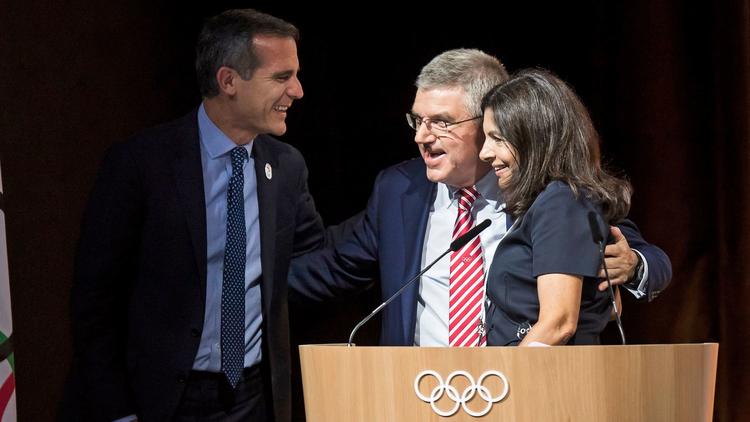
The International Olympic Committee has saved its Games for the foreseeable future.
Whether it can save itself is a far bigger, and far less certain, concern.
President Thomas Bach and the rest of the IOC’s leadership are patting themselves on the back for this week’s coup. With one city after another treating the idea of hosting the Olympics like a communicable disease, the IOC managed to find homes for the 2024 and 2028 Summer Games. In two of the world’s most prestigious cities, Paris and Los Angeles, no less.
But the celebrations can’t mask the stench of corruption that permeates the IOC.
About the same time Bach was announcing the new host cities Wednesday, The Guardian was reporting that the son of longtime – and influential – former IOC member Lamine Diack had spent hundreds of thousands of dollars on jewelry during the Tokyo and Rio bid campaigns. On the day Rio was awarded the 2016 Games, in fact, a company linked to Diack’s family made a payment of more than $75,000 to a jewelry store in Paris.
What a coincidence.
As if that wasn’t embarrassing enough, there was the glaring absence at the IOC meetings of Carlos Nuzman, the powerbroker who steered Rio’s bid for last summer’s Games. Apparently Nuzman’s powers of persuasion with his fellow IOC members came with some cold, hard cash, as his house was raided and he was questioned by police last week in an alleged vote-buying scheme.
There are others accused of corruption, but you get the idea. Almost 20 years since the Salt Lake City bid scandal prompted reforms and supposed soul searching, graft is still very much the name of the Games.
“Every time another IOC member is implicated in something potentially nefarious, we lose more credibility,” Dick Pound, a Canadian who is the longest-serving member of the IOC, told BBC Sport earlier this week.
“What are we doing taking all these hits and doing nothing about it?” Pound added. “We’ve got to recognize that we haven’t done enough.”
Change that to the IOC doesn’t care enough, and we’re getting somewhere.
The IOC makes some royal families look like paupers, what with the five-star hotels, the first-class transport and the per diems that can run as high as $900. When that’s the level of expectation, should it really be any surprise that people trying to win approval from the IOC would come calling with cash in hand?
Of course not. And the IOC has long known this.
Diack was reprimanded by the IOC in 2011 for taking kickbacks almost a decade earlier. The Associated Press reported Wednesday that a former member of the Brazilian Olympic Committee warned then-IOC president Jacques Rogge about Nuzman and the potential fiasco of a Rio Games eight years ago.
The IOC’s response? A cursory thank-you note – and a heads up to Nuzman.
“When evidence is provided (in the Nuzman case), we will act,” Bach said Monday. “But in order to take action, you need evidence.”
A spine, too.
To think it was only Tokyo and Rio organizers who tried to sweeten their chances is naïve. And, indeed, there have been whispers of other bids throughout the years, even after the Salt Lake City reforms were enacted.
But rooting out corruption is hard, and changing the culture that allowed it to fester is even harder.
The IOC’s own arrogance has done part of the job. With white-elephant venues and bloated budgets in Athens, Beijing, Sochi and Rio, the once-coveted event is now a non-starter for most cities. Hence the IOC’s willingness to upend its own rules and award 2024 (Paris) and 2028 (Los Angeles) at the same time.
But when there’s no competition for the Games, there’s no reason to offer bribes, either.
The IOC bought itself some time with the Paris-LA double. The Winter Games of 2026 are the only Olympics that need to be awarded during the next six years, giving the IOC the space to decide what it wants to be going forward.
An international band of grifters? Or committed stewards of the Olympic ideals?
The choice should be obvious. But the IOC has done little to show its up to the task.
By Nancy Armour
This article was republished with permission from the original author and 2015 Ronald Reagan Media Award recipient, Nancy Armour, and the original publisher, USA Today. Follow columnist Nancy Armour on Twitter @nrarmour.